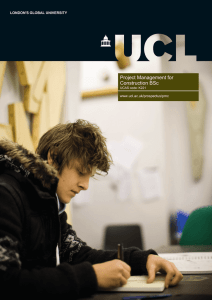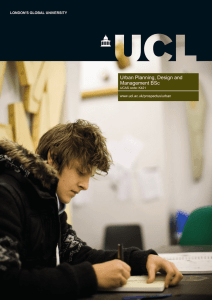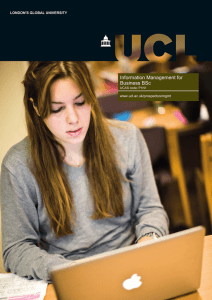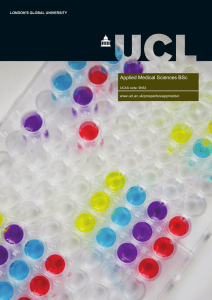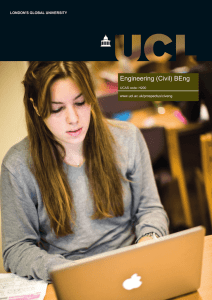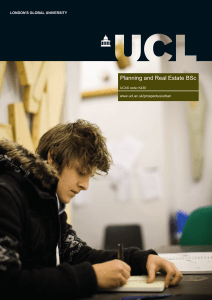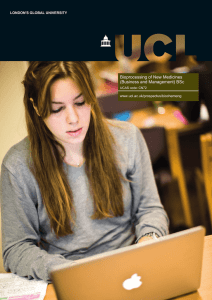Architecture BSc LONDON'S GLOBAL UNIVERSITY www.ucl.ac.uk/prospectus/architecture UCAS code: K100
advertisement
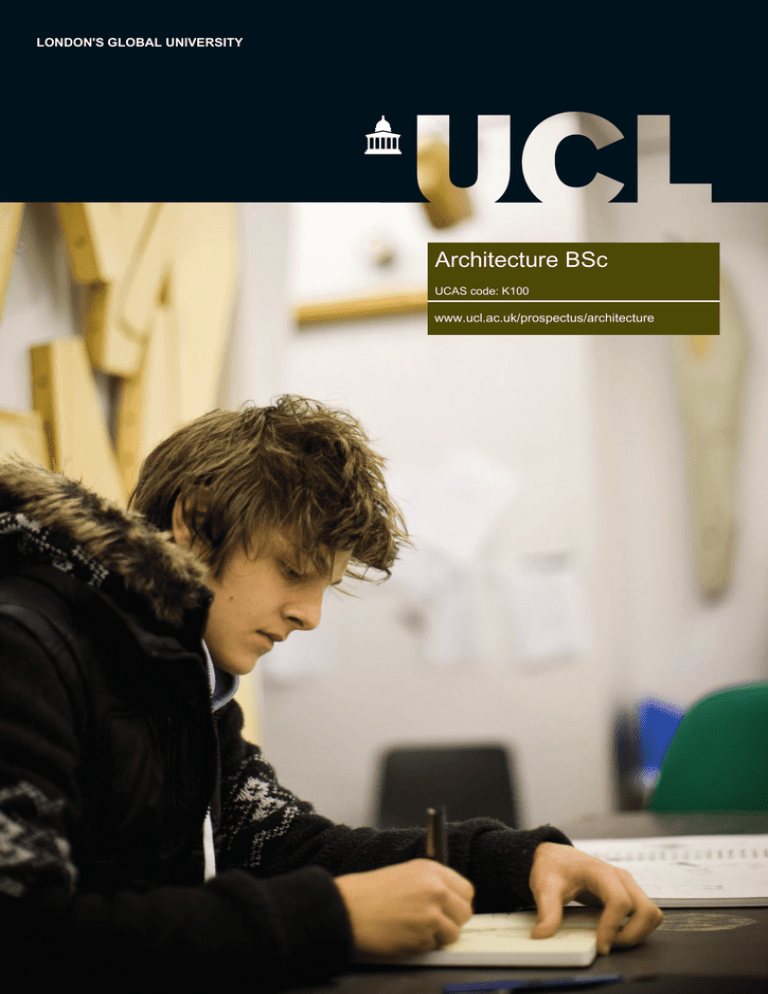
LONDON'S GLOBAL UNIVERSITY Architecture BSc UCAS code: K100 www.ucl.ac.uk/prospectus/architecture Architecture BSc The Architecture BSc aims to inspire and exercise you in a wide and diverse range of experiences so as to develop an independent, creative, experimental and rigorous approach to design. You are guided in discovering your own vision in architecture within a vibrant and exciting culture. Degree summary • Architecture BSc is renowned for its innovative and experimental research in the discipline, including design, history and theory, professional practice and innovative technology. The school has been voted the UK's best by The Architect's Journal every year since 2001. Your learning The programme is based in the studio and the workshop, and the majority is taught through individual design projects. Most of the design teaching is on a one-to-one tutorial basis with frequent review sessions; nearly all design tutors are practising architects or design specialists. History and theory, professional studies and technology core courses support the design work in each year. • Excellent resources, including an extensive workshop (known as the Bartlett Manufacturing and Design Exchange B-MADE)that is widely regarded as the best of its kind in UK architectural education. • B-MADE offers access to traditional woodwork and metalwork resources, as well as robotics, 3D printing, CNC machining, 3D scanning, advanced computing and materials testing. • 70% of the programme is taught through a series of design projects and assessed through the design portfolio. The history and theory, professional studies and technology core courses are assessed through a combination of coursework, essays and examination. All students participate in the annual Bartlett Summer Show, a major exhibition at the end of the academic year which attracts over 5,000 visitors. Your career Your first year will be centred on design studio projects which develop the central skills of observation, design and representation, emphasising the expression of ideas. Complementing this are lecture courses on history and theory, production of the built environment, and technology, and a field trip to a major European city in the second term. Successful completion of the Architecture BSc leads to exemption from Part 1 of the Architects Registration Board (ARB) and Royal Institute of British Architects (RIBA) examinations. Students typically then take a Year Out in an architect's office in the UK or overseas before applying for a two-year Graduate Diploma/MArch programme. In years two and three, you join one of up to ten design units. Each unit offers a different architectural approach, allowing you to develop personal architectural interests and to work with architecture in relation to subjects as diverse as film, fashion, history, philosophy and science. Our graduates have a good record of employment and destinations vary from internationally renowned offices to small-scale specialist practices. Increasingly, however, some architecture graduates are also using their highly transferable skills in other design-related disciplines, such as film-making, website design and furniture design. Your work in the second and third year studio is complemented by a core lecture series in computing, technology, history, theory and professional studies. First career destinations of recent graduates (2010-2013) of this programme include: • • • • • Architect Assistant, Rogers Stirk Harbour & Partners Architect Assistant, Foster & Partners Architect Assistant, Make Architects Architect Assistant, John McAslan & Partners Architect Assistant, Hawkins\Brown Degree structure In each year of your degree you will take a number of individual courses, normally valued at 0.5 or 1.0 credits, adding up to a total of 4.0 credits for the year. Courses are assessed in the academic year in which they are taken. The balance of compulsory and optional courses varies from programme to programme and year to year. A 1.0 credit is considered equivalent to 15 credits in the European Credit Transfer System (ECTS). Year One Compulsory courses Environmental Design Historical and Cultural Developments of Cities and their Architecture The Production of the Built Environment Structure, Materials and Forming Techniques Four Design Project courses Optional courses All first year courses are compulsory. Year Two Compulsory courses Computing for the Built Environment Design Technology II History and Theory of Architecture Three Design Project courses Optional courses All second year courses are compulsory. Final Year Compulsory courses Design Technology III History and Theory of Architecture Preparing for Practice Three Design Project courses Optional courses All final year courses are compulsory. Entry requirements A levels All applicants likely to meet our entry requirements (including those resident outside the UK) are invited to submit an assessment task based on a brief that changes each year. On the basis of this around 400 applicants are shortlisted for interview days. Overseas applicants may be assessed without an interview. A level grades AAB A level subjects No specific subjects. Comprehensive portfolio of creative work required at interview stage. AS levels For UK-based students a pass in a further subject at AS level or equivalent is required. UK/EU fee £9,000 (2016/17) Overseas fee £21,320 (2016/17) GCSE English Language and Mathematics at grade C. For UK-based students, a grade C or equivalent in a foreign language (other than Ancient Greek, Biblical Hebrew or Latin) is required. UCL provides opportunities to meet the foreign language requirement following enrolment, further details at: www.ucl.ac.uk/ug-reqs Notes Details about financial support are available at: www.ucl.ac.uk/study/ug-finance IB points 36 Contacts Subjects A score of 17 points in three higher level subjects, with no score lower than 5. No specific subjects are required but a comprehensive portfolio of creative work is required at interview stage. Contact Fees Grocer's Company Queen's Golden Jubilee Scholarship. One scholarship of £2,250 for the programme's duration is awarded every two years. All students admitted to the programme will be considered. IB diploma Mrs Chris Cutbush Faculty Undergraduate Programmes Manager Email bartlett-faculty@ucl.ac.uk Telephone +44 (0)20 3108 9637 Other qualifications Prospectus entry www.ucl.ac.uk/prospectus/architecture Full lists of all degree programmes and other entry requirements can be found on our website at: www.ucl.ac.uk/otherquals Key facts Undergraduate Preparatory Certificates UCL's Undergraduate Preparatory Certificates (UPCs) are intensive one-year foundation courses for international students of high academic potential, who are aiming to gain access to undergraduate degree programmes at UCL and other top UK universities. For more information see our website: www.ucl.ac.uk/upc Your application Application for admission should be made through UCAS (the Universities and Colleges Admissions Service). Applicants currently at school or college will be provided with advice on the process; however, applicants who have left school or who are based outside the United Kingdom may obtain information directly from UCAS. We are looking for highly motivated individuals with a strong interest in design and an open mind for new ideas. A love for the creative arts and a desire to challenge preconceptions about architecture is essential. PDF Updated: February 19, 2016 Information correct at time of going to press. See website (www.ucl.ac.uk/prospectus/architecture) for latest information REF 81% rated 4* (‘world-leading’) or 3* (‘internationally excellent’) Department Bartlett School of Architecture Faculty Built Environment

